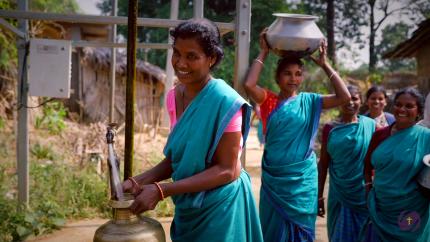It’s just water.

It’s just water.
It seems like a simple story: when clean water is accessible in a community, it contributes to health and wellbeing. Without it, survival is impossible. And while that’s true, the effects of access to water go much deeper, too.
My colleague Helen works with World Renew in Asia, and she has seen first-hand what these effects mean. “We worked in a Hmong village with an inadequate water system built a long time ago and far away from the village centre. It was not really producing very much water, which meant that children would be woken up very early in the morning, like 4 a.m., and asked to go to the water source with their buckets or their big water containers and line up to access the drip of the water that was coming out of this water system,” she says. “So they would queue for hours and hours and hours and then put the bucket under the drip of the water that was coming out, and it would fill very, very slowly.” In a village like this one, a single household might have eight or more people and therefore require several containers of water containers. The children’s parents might arrive several hours later to help them carry the water containers back to the house. This was something that probably happened at least twice a day, or maybe even three times a day, depending on the need of the family for water and the number of people in the family.
It is easy to see how clean water means much more than survival. It means justice.
There are similar stories taking place on the other side of the world, where María lives in Nicaragua. For years, she had to walk a mile each way to access water. The time and effort was significant, but the scary part for María was leaving her three children alone while she went to collect it and wash clothes there. “With the issue of water, you have to figure it out,” María says. “It is an essential need that has to be solved.” She would sometimes ask neighbours to assist her with water from their wells but worried that she was being a nuisance.
For girls and young women in rural villages throughout Africa, being designated water carriers for their household means similar long journeys to sources of clean water. These daily treks make them vulnerable: to exhaustion, to missing school, and to gender-based violence as they walk along at early or late hours. And because water carrying is one of the less intensive tasks, it is often the least physically strong family members who are saddled with this responsibility.
Thinking of María and so many others in these precarious positions, it is easy to see how clean water means much more than survival. It means justice. When plentiful clean water sources and equitable solutions to water collection are created, girls are no longer as vulnerable to gender-based violence.
María and her neighbours worked with World Renew and our local partner to implement a water system in her community. She and her husband are helping dig ditches, install pipes, and construct water meters, and they are encouraging other families to join.
When I hear stories of these faith communities taking leaps of faith to serve God, I see a more perfect vision of the body of Christ fulfilled
“This water system will alleviate a huge workload for us women,” says María, who won’t have to carry or beg for water now. “With water in the house, I will no longer have to go down to the stream to wash and leave my children alone. ... Having water means dreams coming true!”
The Hmong community worked with World Renew to access a new source of water and install additional taps with better water pressure. “When we asked the villagers to tell us the story of the impact of this water system, the story they told wasn't the one that you would intuitively think,” Helen says. She anticipated hearing about how they could better wash their clothes, their hands, or themselves. "But the story they told was about how the children can go to school now.” Because these young people are able to fetch water more efficiently, they are no longer skipping classes.
It’s easy to draw a parallel from these examples to the “living water” Jesus refers to in the gospels (John 4, John 7). The redemptive vision motivates us to think beyond the essentials and surface-level value of the gifts and resources God has bestowed on us. So many of us throughout the global church are using those resources in generous ways. How can we dig even deeper? When I hear stories of these faith communities taking leaps of faith to serve God, I see a more perfect vision of the body of Christ fulfilled: a Canadian congregation saving up for years to sponsor a refugee family fleeing conflict and persecution. A group of volunteers from churches across the US spending their holiday time in North Carolina to rebuild homes devastated by Hurricane Helene. A congregation in Malawi learning sustainable agriculture practices and then donating their surplus crops and animals back to the church. Consider how our communal choices can bring about the justice intended for creation and all of God’s children living in it.
Access to clean water does more than hydrate the body; it offers a life-giving channel of mercy, goodness, and shalom. It’s just water.




